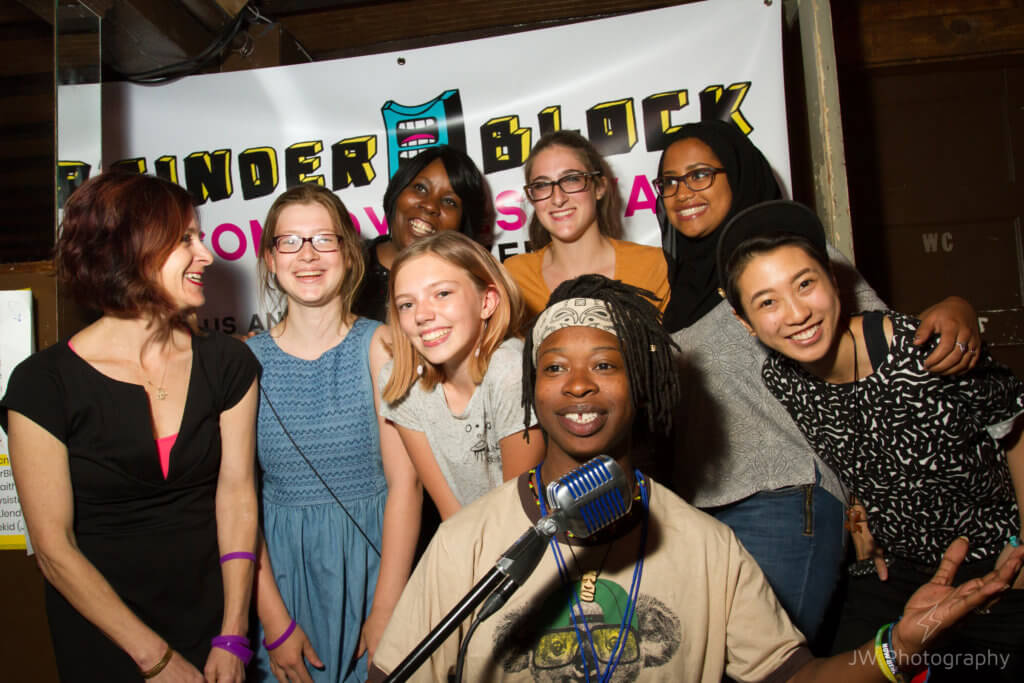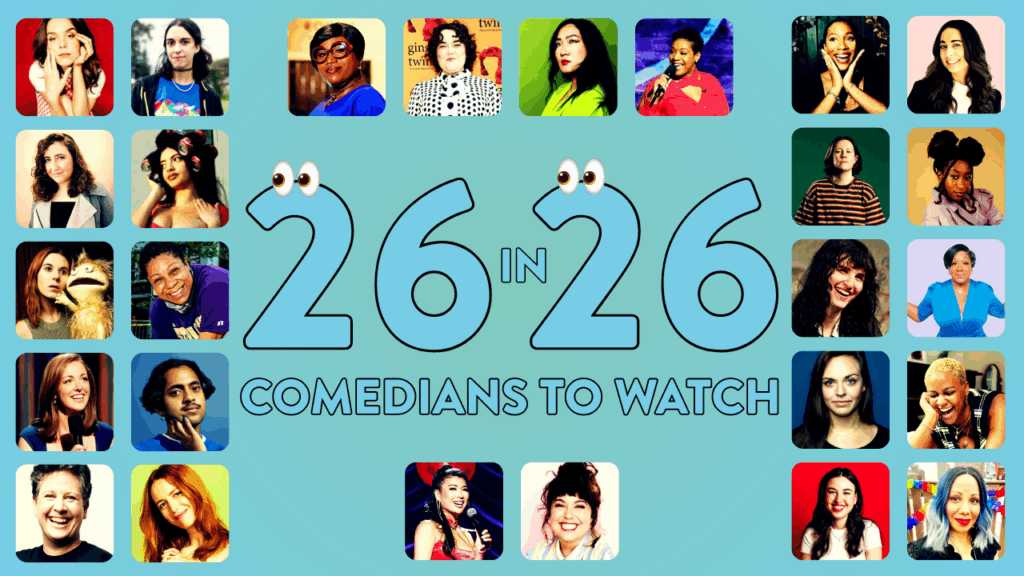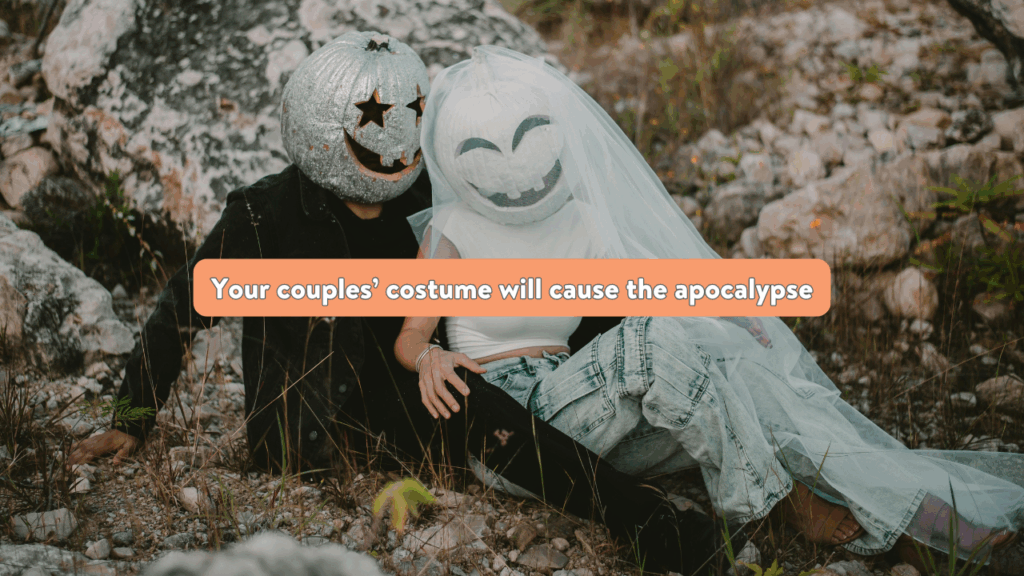7 reasons why comedy needs more girls

We need more women in comedy.
The more women do comedy, the more women define comedy.
And “more women in comedy starts with more girls in comedy,” as tweet-noted by GOLD fan/fam Daniel Radosh, senior writer/producer for The Daily Show with Trevor Noah (and formerly of The Daily Show with Jon Stewart).
What’s the rush?
Change is happening in comedy RIGHT NOW, and you can help it happen faster.
Where we are: Dudes still dominate comedy, both onstage and behind the scenes. Comedy bookers are STILL weird about booking women, with female comedians STILL being told (directly or otherwise) that sorry, there’s “already a woman” in a given show. Female comedians in the trenches still get less stage time than their male counterparts. And! Only one female comedian—Amy Schumer—has ever made it onto Forbes’s highest-paid comedians list; that took until two thousand freaking sixteen. And no woman has made it since. This is why “it’s a terrible time” for women in comedy, according to none other than Tina Fey. As she told Town and Country, “If you were to really look at it, the boys are still getting more money for a lot of garbage, while the ladies are hustling and doing amazing work for less.’”
As New York Magazine’s (and Good One podcast’s) Jesse David Fox noted: “The pool of stand-ups networks can draw from is largely based on already-established comics, meaning previous bias factors in, and it can be difficult for up-and-coming talent—especially women—to get noticed in the first place. The point being there need to be more female comedians progressing through the stand-up stages, and that will take time.” (So YOU! Start now!)
Where we’re going: “The emergence of new female voices over the past five years has brought us to a point where the importance of women in American comedy cannot be glossed over,” Yael Kohen writes, “and there is no going back.”
BOOM. Why? Because, Kohen notes, today we have:
- Demand for points of view beyond those of white men.
- The growth and dominance of niche audiences.
- The power of social media to LIKE (or NOT)
- YouTube, podcasts, etc. that enable creators to skip the middleMAN
“Women have been thriving in these alternative channels for years, and now that the alternative is the norm, female comedians are especially prepared to take advantage of a new climate,” Kohen writes. “Female comedians have always been ahead of their time; now, at last, their time is catching up to them.”
AWESOME! But why comedy?
We need more women in many professions, such as president of the United States, and Ghostbuster. But bottom line, comedy matters. So there are at least 7 reasons why women—starting with you!—matter to comedy.
Comedy is power.
When you tell jokes, you are in charge. You’ve got the mic, the spotlight, the punch. You can tell your story any way you want. That’s power. More women should have that. (More women—and people—of all colors and shapes and lifestyle choices should have that.) More women in comedy would mean that the default setting for FUNNY—and all the power and perks that come with it—would, and could, no longer be DUDE.
Women are a gender, not a genre.
Imagine this: You arrive to do a standup show. You find out you’re the only woman in the lineup. To introduce you, the emcee says: “And now we’ve got a laaady coming to the stage!”
Then you have a big job. A dude comic just has to spend the next eight minutes proving that he is funny. YOU you have to spend the next eight minutes proving that WOMEN are funny.
This is also why Aparna Nancherla says “‘What’s it like to be a woman in comedy?’ 1% jokes and 99% answering this question.”
More women in comedy would mean that each individual woman does not have to represent her entire gender, which no woman (or man, or person) can do anyway. More women in comedy would mean that people would finally stop talking about two kinds of comedy: comedy, and “women’s comedy.” Or two kinds of comics: comedians, and, God help us, comediennes. It’s numbers. We need enough women in comedy so that we’re no longer DIFFERENT, or INTERESTING. We’re just comics.
Comedy is business.
Comedy is work. It might be fun, and even funny, but—like ditch digger and yogapreneur—it’s a job.
So if you get treated differently from men when you do your job, that’s uncool, at best. Illegal, at worst. (You may also be aware that comedy also has a serious sexual harassment problem.) As with any other business, there’s individualized and institutionalized sexism (and other -isms and -phobias) that keep women (and others) down, sidelined, or out.
That’s bad for individual comics, and for business. Setting aside the discrimination and harassment, more women in comedy means more jokes! More jokes about more things! More jokes about more things from more than only 50% of the population! And more jokes means more laughs, which means more dollars. People should do more math.
Take it from movies: Among the 25 top-grossing movies 2006 to 2015, those about women “earned $45.5 million more than movies about men,” Mic reported, noting that 97 of those 133 movies are about men. “Only 36 are about women—the people who are the bigger box office draw. That’s not just poor representation, it’s also bad business.”
Or television! James Poniewozik on Why diverse TV is better TV: “Audiences for everything are smaller now, which means networks aren’t programming each show for an imagined audience of tens of millions of white people. On top of that, there are younger viewers for whom diversity—racial, religious, sexual—is their world. That audience wants authenticity; advertisers want that audience.”
More women in comedy makes everyone funnier.
Comedy, like almost anything else, is better with more voices.
And comedy especially benefits from more outsider voices. “Just as women have emerged as the leaders of the nascent [#resist] movement, so are women behind some of the sharpest political satire of the moment,” wrote Laura Zarum in Flavorwire. “Not because we’re inherently superior to men but because it’s easier to punch up when you’re already one rung down.”
That rising tide lifts all boats—even S.S. Straight White Dude. The magnificent Cameron Esposito breaks it down. “If you are a straight, white, 22-year-old dude and you do stand up comedy, there are a lot of you. So if you put a woman who is black and 35 in between two straight, white, 22-year-old dudes, those dudes look more interesting. They get to be a counterpoint, and that’s something that straight, white men rarely get to experience. Not only were the people that had historically less representation benefitting from being around more diversity, but the people who were in the majority were too.” (Extra credit: read this.)
Comedy has something to say.
Comedians are “today’s public intellectuals,” as The Atlantic put it. “People look to Amy Schumer and her fellow jokers not just to make fun of the world, but to make sense of it. And maybe even to help fix it.” (According to Salon, we also expect comedians, in the face of public tragedy, to “comfort us.”)
In a different Atlantic article, Megan Garber observes that much high-profile comedy today is “distinguished by the fact that it isn’t content simply to elicit laughter. It has an ethic and a vision, and strives to convince its audience of the rightness of that vision. Comedy that argues and insinuates and in general has Something to Say about the world.”
And if more minds could be opened to more ideas from more people who don’t necessarily look like them, we’d all be better for it. We’re talking to you, late night comedy. Sam Bee is lonely out there.
Funny women open people’s minds (including women’s).
If every single personal ad ever is any guide, we are all looking for a partner with a “sense of humor.” But science breaks that down a bit: “Women want men who will tell jokes; men want women who will laugh at theirs.”
In that same article (again with The Atlantic!), Olga Khazan writes: “The way men and women laugh and joke has been so different for so long that it’s hardened into a stark, oppressive social norm. Norm violators get punished, and often, that means funny women are punished, too. These biases have a chilling effect on women. The idea that women aren’t supposed to make jokes can trigger stereotype threat, a phenomenon in which simply telling someone that their ‘group’ tends to be bad at something hinders that individual’s performance. Told that their humor isn’t wanted, many women don’t bother.”
But it is wanted! Comedy: support and promote women, all kinds of women, and more women will “bother,” and more people will get used to it, and more people will watch more of your shows, and more people will PAY TO watch more of your shows.
More women in comedy means more women in comedy.
White dudes who try standup or improv invite their friends to their shows. Their friends are, perhaps, mostly white dudes. When white dudes in the audience see funny white dudes on stage, audience white dudes go, “I could do that.” Then those white dudes try standup or improv and INVITE THEIR FRIENDS. And: THE CYCLE CONTINUES.
Here’s the flip side. “Women are limited in our imagination by the things that we have seen women do,” says Cameron Esposito. “So if you just go to a room and you watch other women tell jokes, there is something that switches in your mind where then you realize that you can tell jokes. We also don’t see ourselves as presidents because we never have female presidents.”
Comedy needs more women—and more everyone—so that more everyone will get into comedy.
So what do we do?
Get more women into comedy.
How?
People with power in comedy should work hard to book women, hire women, represent women, and mentor women. They’re there.
Don’t just say “no one sent me any packets from women.” At this point, that’s just hacky. Just ask Trevor Noah. In a conversation with Lupita Nyong’o and the New York Times about hiring his writing staff, he said:
I said, “I want more diversity.” They said, “But this is what we’re getting.” So I went to all the young comedians I knew—black, Hispanic, female, whatever—and I said, “Are you interested?” And they all said: “Are you crazy? Of course, I’m interested.” So I asked, “Why didn’t you audition?” And they said, “We didn’t know about it.” But they told me they’d sent it out to all the agents and managers. And they all went: “Oh, that’s where you made the mistake. We can’t get agents or managers.” We can say we want diversity, but there’s this little roadblock that no one tells you about.
Agents and managers: go out of your way to agent and represent women. (And all sorts of people outside the mainstream.) That’d be a start.
GOLD likes to start even earlier by telling teen girls that it’s good to be funny. That you are already funnier than you think. GIRLS: Being funny means being exactly who they are already, just with a few more punchlines. Comedy is not what dudes do and girls laugh at. Comedy is YOURS. Whether you want to be standup funny, or YouTube funny, or improv funny, or Instagram funny, or funnier stump speech for class president funny, comedy is power, and that power is YOURS.




